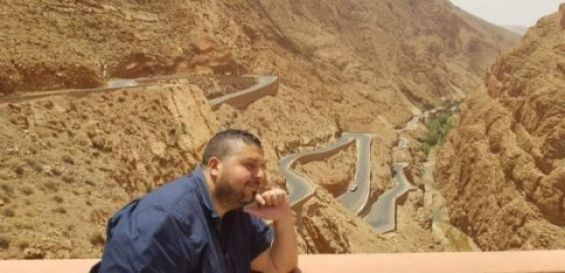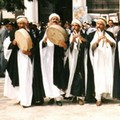Born in Belgium in 1971 to Moroccan parents who immigrated to Europe at the end of the 1960s, Mohsin Mouedden has a long experience in the volunteering in Brussels. The eldest of three sisters and three brothers, he grew up in Anderlecht. He remembers that his parents, who have a perfect command of both written and spoke Arabic, were among the few literate heads of families in his entourage. But like many children in his situation, he did not have the chance to go to college and dropped out of school before getting his high school degree.
«Success was rather an exception and during the 1980s, few young people with an immigrant background went to college. It was especially those who were not born here and who came from Morocco to continue their studies who stood out the most», he remembered. Mohsin recalled having attended «one of those schools with 'positive discrimination' and which were known for widespread violence».
«I preferred to abandon school as it sanctioned discrimination against children from Moroccan, Turkish, Italian or Spanish descent, who were the poorest and most vulnerable.The social, economic and psychological problems were transposed there and the teaching teams were not trained for that».
Training and volunteering
Although Mohsin did not like school, he was fond of books. «I was eight when I read my first comic book and it was a revelation for me. Reading saved me», the activist said. Like many of his comrades, he admitted having skipped classes for several hours, but not for the same reasons. «I would find refuge at the Riches Claires library in the city center of Brussels. I used to spend three to five hours there while my parents would think I was in class. I read everything from magazines to novels, biographies and geopolitical books», he recalled.

At the same time, his activism career began to take shape. It started with the civic demands on immigrants' right to vote and the fight against discrimination. Since the age of 15, he had participated in demonstrations against the Gol law. «There were also racist crimes in the early 1980s that we denounced and we were very sensitive to the Palestinian cause, particularly after the first Intifada», he told Yabiladi.
After dropping out of school, Mohsin Mouedden started working. «I went through virtually every job that existed: salesman, pump attendant, waiter in restaurants… I emancipated myself from the family cocoon when at age 18».
By rubbing shoulders with young people like him, he developed an interest in understanding the situation of migrant populations in the country where he was born. «After 30 years of existence of our communities here, many of us were still living below the poverty line and that made us reflect on it. So I took a three-year training course to become an educator and started working with young people, setting up civic activities and projects». It is hence that his career ascoordinator and organization director in Belgium started.
«With a group of three people, we also had to speak on behalf of the youth who took part to riots a few weeks before.We met with the Interior Minister at the time to voice our demands».
His idea was to «work on the question of identity in working-class neighborhoods, on the question of the civilization of Al-Andalus, so as to combine the Western identity and Arab-Muslim or Berber-Muslim». Within this framework, he set up a training program for young people over one year, with weekly sessions. «At the end of the day, there was a trip to meet Spanish trade unionists, workers in Andalusian greenhouses and visit the Islamic and Jewish heritage of Cordoba, Seville and Granada», the activist explained.
A commitment to the Palestinian cause
His associative experience led him to create the Palestine Citizen Movement (MCP) in 2002, during the siege of the Moukataa against President Yasser Arafat. «At that time, part of the Belgian political world was afraid of my positions and I began to feel fierce opposition from the elected representatives from minority backgrounds themselves», he recalled.
During the Israeli bombing raids on Gaza in 2008-2009, Mohsin worked for Brussels Arab Radio (Al Manar) and the Journal du Mardi. His activism resulted in his exclusion from the radio station where he worked for ten years, and attacks from politicians.

Following a period he described as «very hard to manage emotionally and psychically», Mohsin decided to take a step back in 2009. «I was continually subjected to death threats and public insults, without having much political support», he regretted. But the Palestinian cause remains «dear to [his] heart», and he expressed at regret the recent restauration of ties between Morocco and Israel. In 2010, he distanced himself from activism, after five years of involvement within the Movement against Racism, Anti-Semitism and Xenophobia (MRAX), where he worked on issues related to Islamophobia.
Repatriation of Belgian-Moroccans stranded in Morocco
«I was parliamentary assistant for a senator leaning towards environmentally-friendly policies and I had just left my functions when a sanitary confinement was announced in Belgium. I told myself that this period would allow me to take a rest but I was contacted by a socialist friend, who asked me for help because her son was stranded in Tangier. Eventually, I created a group on Facebook to see how we could help other people who were in the same situation».
Mohsin Mouedden received hundreds of messages, emails and calls. «We had written to King Mohammed VI, reached the head of the Moroccan government, the Minister of Foreign Affairs in Morocco, that of the Interior, institutions, but nothing helped. The person who quickly called me back on the Moroccan side was Ambassador Mohamed Ameur», he recalled.
«I used to sleep four hours a day and had to remain available for all requests, every day.I was completely overwhelmed by the requests.But it was impossible to ignore them, because bonds were forged and I considered all of these people to be members of my family, especially when you see that many of them were old or sick».
Following Mohsin's actions with members of the parliament, head of Belgian diplomacy Philippe Goffin «was questioned on the issue in Parliament every Tuesday, which pushed him to make decisions». «After great pressuring efforts with the help of politicians and the media, we were able to obtain several repatriation operations in coordination with the authorities of the two countries as well as airlines, until the month of July», he explained.

During those months, many human stories of Moroccans living in Belgium were touching, in particular «the difficult repatriation of little Raith, who remained with his grandmother in Tetouan, as Belgium did not want to repatriate him. We had to go through the Moroccan Minister of Foreign Affairs who made sure that he could be reunited with his parents by the day of Eid el Fitr». Internet users also remember the reunion of 16-year-old Reda with his little brother after a long separation. Since then, the group's actions have broadened to include Maghrebi-Belgians who fight for their rights and freedoms.





 chargement...
chargement...













